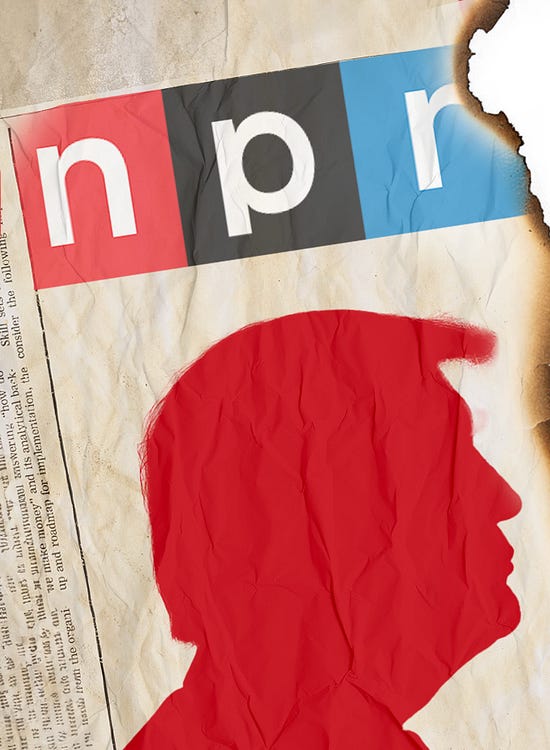
The Free Press

National Public Radio is suing the Trump administration for cutting off its federal funds, which, according to NPR’s complaint, is a “blatant,” “textbook” First Amendment violation.
But NPR seems to have forgotten some free speech basics. As the District of Columbia District Court—the court where NPR filed suit on Tuesday—stated just a few weeks ago, “the government does not abridge the right to free speech by choosing not to subsidize it.”
On May 1 of this year, Trump issued another of his innumerable executive orders, this one telling the Corporation for Public Broadcasting—the vehicle through which the government disburses about $500 million annually to public radio and television—to stop giving any more federal money to NPR and PBS. The executive order said funding would be withheld because “neither entity presents a fair, accurate, or unbiased portrayal of current events to taxpaying citizens.”
NPR denies it’s biased. But in these pages a year ago, a then–NPR senior editor, Uri Berliner, begged to differ.
After the 2016 election, he wrote, NPR engaged in concerted “efforts to damage or topple Trump’s presidency.” In October 2020, NPR refused to cover the Hunter Biden laptop story—and boasted about it. “Why haven’t you seen any stories from NPR about the NY Post’s Hunter Biden story?” tweeted NPR’s public editor two weeks before the election. The answer: “We don’t want to waste our time on stories that aren’t stories” and “that are just pure distractions.”
Berliner added color to this episode: “During a meeting with colleagues, I listened as one of NPR’s best and most fair-minded journalists said it was good we weren’t following the laptop story because it could help Trump.”
Given the ideological diversity among NPR journalists, such bias would hardly be surprising. As Berliner wrote, “In D.C., where NPR is headquartered and many of us live, I found 87 registered Democrats working in editorial positions and zero Republicans. None.”
But NPR, in its complaint, says the government can’t defund public radio or television for being politically biased. That’s “an egregious form of content discrimination,” forbidden by the First Amendment.
NPR is right that taking action against a news organization because of its biased political news coverage is what First Amendment jurisprudence calls a “content-based” distinction, and it would usually be flat-out unconstitutional. But again, some free speech basics: When the government is subsidizing speech, the normal rule against content-based discrimination doesn’t apply.
“It is well established,” as the Supreme Court held in 2007, “that the government can make content-based distinctions when it subsidizes speech.”
No broadcaster has a right to taxpayer funding. The government is not constitutionally obliged to subsidize any activity it doesn’t want to fund, even if that activity is constitutionally protected. To quote the Supreme Court again: The “refusal to fund protected activity, without more, cannot be equated with the imposition of a ‘penalty’ on that activity,” which is why the typical “recourse” for a party that “objects to a condition on the receipt of federal funding” is “to decline the funds.”
But Trump is not merely engaging in content discrimination, says NPR; he’s engaging in “viewpoint discrimination.” That’s possible, although the executive order is carefully drafted to avoid explicit viewpoint discrimination.
“Which viewpoints NPR and PBS promote does not matter,” says the order. If the administration is defunding NPR and PBS solely because their coverage is slanted and inaccurate, and not because of the particular viewpoints they espouse, that’s not viewpoint discrimination as a legal matter, and it’s consonant with CPB’s statutory mandate to maintain “strict adherence to objectivity and balance” in the programming it funds.
On the other hand, as NPR’s complaint points out, an administration fact sheet publicizing the executive order strongly emphasizes NPR’s and PBS’s anti-Republican messaging. For example, it quotes research showing that “congressional Republicans faced 85% negative coverage, compared to 54% positive coverage of congressional Democrats” on PBS’s flagship news program, and over “a six-month period, PBS News Hour used versions of the term ‘far-right’ 162 times, but ‘far-left’ only 6 times.”
But these illustrations don’t quite prove viewpoint discrimination on Trump’s part. After all, if you’re trying to illustrate that a news organization is biased, and if that organization’s bias happens to be decidedly pro-left, then all your examples of bias are going to be pro-left examples.
But suppose the administration’s funding cutoff was viewpoint-based. That still doesn’t necessarily make it a First Amendment violation.
It’s true that a viewpoint-based funding condition can be unconstitutional. For example, the government could not offer subsidies to all nonprofits conditional on their supporting only Republican initiatives. It could not revoke Social Security to people who post pro-Democratic opinions online. But if the government wants to get totally out of the business of subsidizing NPR and PBS, there’s no doubt it can do so.
Imagine that public broadcasting began expressing hatefully anti-American viewpoints. If NPR started closing out All Things Considered with “God damn the United States,” or if PBS started running a chyron under its news coverage saying, “Death to America,” does anyone think Congress couldn’t pull the plug on their funding?
NPR also alleges in its complaint that the federal statute creating the Corporation for Public Broadcasting prohibits Trump from making this defunding decision. That’s a very different argument, which I’m not addressing here. But if the question is whether U.S. taxpayers are constitutionally required to fund ideologically slanted news organizations, or indeed any news organizations, the answer has to be no.




